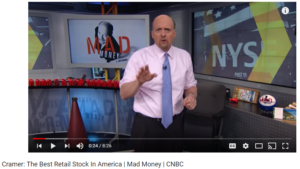He did make some solid points, namely about the importance of finding someone independent and trustworthy with an investment style you’re comfortable with. These characteristics are crucial to your peace of mind— your future is everything, and you need someone with your goals in mind managing your money.
The author made finding your dream advisor seem as easy as asking a friend or someone you respect for a recommendation. I hate to break it to you, but he or she doesn’t exist— unless you consider yourself an option. Who knows your needs, risk-tolerance, and plans for the future better than you?
If you’re like most people, it’s easier just to delegate difficult tasks to an “expert”, paying them for their time. The financial system is made to seem as complex as possible, further encouraging otherwise intelligent people to turn a blind eye to truth and just let someone else deal with the issue. TV pundits and Wall Street “gurus” are on air all hours of the day, presenting complex market analyses and opinions that never quite seem to play out as expected (they’re only designed to confuse you, after all).
Then in between emotionally-charged TV segments, an ad comes on for a prominent financial advising company. A problem is presented— you don’t understand half the financial jargon these “gurus” just rattled off, so clearly you don’t know enough about money!— and then someone comes riding in on a white stallion to help you plan for the future… someone who understands your individual needs so well they’ve tailored a commercial to appeal to as many people as possible. Something fishy here?

When you throw in the fact that the vast majority of practitioners in this multi-billion dollar industry charge fees on assets managed instead of merely on profits, red flags should pop up everywhere. If you ask an advisor about this, they’ll cite it as an “industry norm” and some states do, in fact, require this fee structure, because the industry norm is to ensure the money managers profit whether or not they make money for their clients.
There are some working in this field who charge ONLY a percentage of clients’ gains, ensuring their incentives are directly lined up with their clients’. If you can find one, understand they are the notable exception, and most (good) investors who operate this way quickly close their funds to new money because they have simply grown too large to manage.
But what abou performance? Most of these “professionals” will recommend products (including mutual funds they make a commission on) that offer exposure to the broader market and are heavily focused on US equities and bonds, then tout the importance of diversification. Let’s get one thing straight:
Diversification is ABSOLUTELY one of the keys to excellent long-term performance, but the diversification you’re being sold is a lie.
The benefits of diversification come with having uncorrelated assets in your portfolio. For a US investor, this means that a long-only portfolio full of US Bonds, US stocks, and US indices is NOT diversified AT ALL.
Diversifying by holding individual stocks, sectors, or instruments like bonds together can help you mitigate business and industry-related risks, but you are still fully exposed to the broad US market risk, and this is what can do the most damage as your entire portfolio can lose value when the market hits a rough patch— think early 2000s or the 2008 crisis. If you were planning to retire in 2010, the market had other plans.
The key is to diversify effectively using global markets, long AND short positions, never leaving yourself overly exposed to a surprise event that could devastate any market in particular.

There’s a common misconception that taking a “short” position (one that profits off of an asset’s decline in value) is “Unamerican” as you’re “betting against our economy”.
I’ve heard the same argument used to justify refusing to invest foreign markets. It blows my mind that in the “land of opportunity” the popular course of action is to deliberately leave money on the table and take on more risk than is necessary. After all, the markets only reflect the general economy, and a falling stock price is not what puts a company out of business.
•••
So how can you get started?
The first step is easy— education. Read, watch, and take in as much information as you can. Learn about the pros and cons of different investment strategies, understand the principles of risk and reward, and learn the basics of the primary investment vehicles you might use (stocks, futures, commodities).
Think about your goals and determine what type of strategy you might employ to meet them, but always go in knowing what you could lose and why— you’ll sleep a lot better that way. Look at your life as a big picture, and acknowledge that your financial future is a large and important component. Don’t leave it all up to someone who will win even when you lose.
You have the tools to succeed for yourself. Match that with drive and a healthy respect for risk, and you’ll do just fine on your own.
•••••••••••••••••••••••••••••••••••••••••••••
Matt Nelson is passionate about money
and markets, success, and life in general.
For unfiltered commentary and for
new content notifications,
Follow Matt on Twitter








